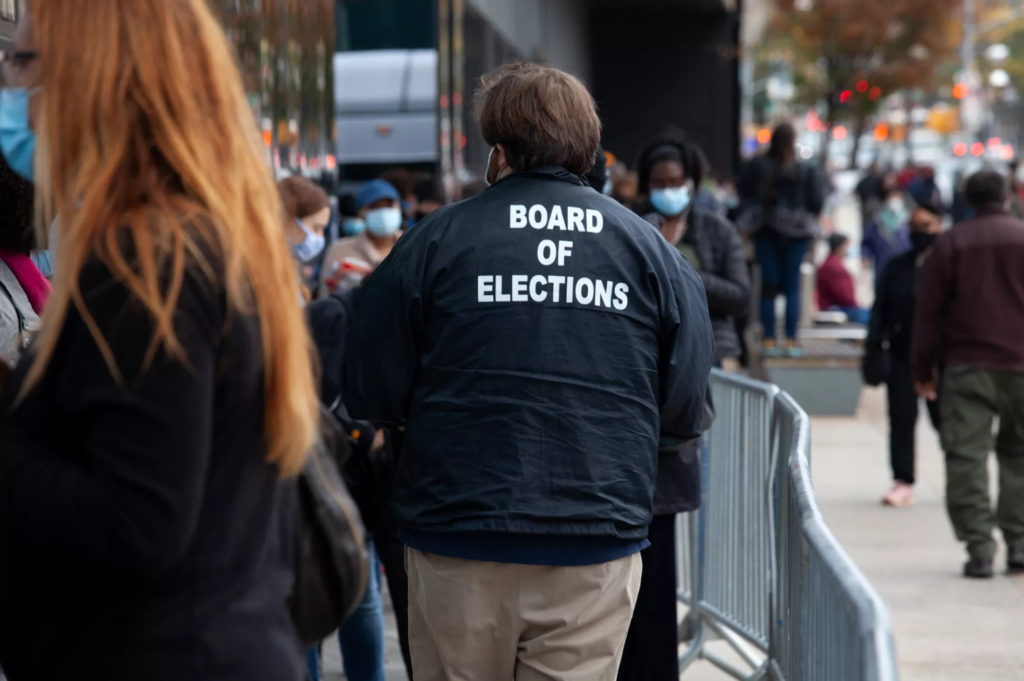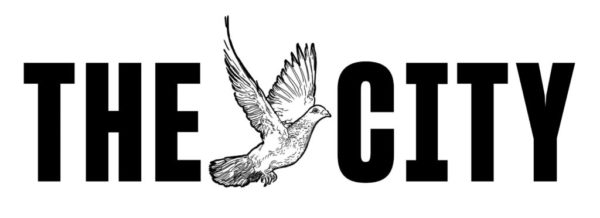And that’s just from the past decade.
“There’s been so much of it that you actually start to forget at some point,” said Tom Speaker, policy analyst at the transparency advocacy group Reinvent Albany. “It’s just this deluge of disasters.”
As New Yorkers hit the polls for early voting in the 2020 presidential election, all eyes are on the BOE, again. On Monday, The New York Times
And after a weekend of long lines at early voting sites as Election Day approaches, Mayor Bill de Blasio and Governor Andrew Cuomo on Monday took turns dunking on the agency .
“I would be open to an entire redesign of the entire New York City Board of Elections system,” Cuomo said. But a short time later, the governor claimed “the state has no role” in how the board is run, even though he has the power to fire commissioners.
Can the board ever change? THE CITY spoke with experts, advocates and reformers who have ideas on how it can be fixed — and believe the moment has finally arrived to make that happen.
The BOE is partisan by design.
Ten commissioners make up the board, which oversees staffing and operations. The Democratic and Republican parties from each of New York City’s five counties — in other words, the five boroughs — appoint one member apiece.
The idea of a two-party-run board, according to State Sen. Zellnor Myrie (D-Brooklyn), chair of the Senate Elections Committee, came from a “genuine desire for us to have checks and balances” — for each party to check up on the other.
To Susan Lerner, executive director at Common Cause New York, the concept is outdated. “This is a 19th century approach towards ensuring the integrity of elections,” she said.
Instead of creating a fair election system, she said, the BOE became a bastion of political favoritism. The leaders of the county political parties hold enormous sway over who gets jobs and board appointments, Lerner said.
Often, party loyalists, friends and families are appointed to plum positions.
In 2013, the city Department of Investigation found that about one in 10 members of the BOE’s workforce were related . Current employees include the wives, siblings and mothers, friends and children of current and former local politicians and borough party bosses, the Times found.
“I have literally had a county chair say to me that I failed to recognize that an important purpose of the Board of Elections was to employ people who would not be able to get positions elsewhere — to which I said, ‘Thank you for your candor,’” Lerner said. “It’s about patronage.”
Poll workers help a voter at the Barclays Center, Oct. 24, 2020. Photo: Ben Fractenberg/THE CITY
But a constitutional change would be overkill, he argued, adding that the much-maligned partisan system should remain intact.
“I think it’s important to have a professional, bipartisan system. It’s the only way that you can actually have checks and balances,” said Polanco. “This idea of nonpartisan doesn’t exist.”
He gives credit for the BOE for implementing some changes in recent years, including posting job openings publicly and webcasting meetings — both measures he tried to implement during his tenure.
Polanco stressed that staffers are “doing the best they can under the circumstances,” while he also acknowledges that moving the needle can be tough.
“It’s difficult to create that kind of change in a board that doesn’t change,” he said.
Who has the power to change the BOE?
Reformers have long called for major changes at the BOE, including getting rid of the built-in partisan power structure and professionalizing the staff. There are currently no job qualifications for commissioners or staffers.
But who has the ability to make those types of big changes?
According to state law , the governor has the power to fire commissioners at the Board of Elections, and the commissioners have the power to hire and fire staff. But disciplinary measures are very rare.
The City Council has final say over the party-made appointments to the Board, but its members rarely object to nominees .
The Council also holds the board’s pursestrings through the city budget. But even when the city has passed legislation ordering the agency to change the way it operates — for example, a law mandating the BOE must post a notice when it moves a polling site — there is little consequence when rules are flouted, Lerner noted.
“The board ignores the city and the city has never enforced any of these laws,” she said.
A number of reformers have floated ideas to change the BOE, including a proposal that would transfer much of the agency’s day-to-day operation to the Campaign Finance Board.
But most advocates say the real power to force change at the BOE rests in reshaping the state constitution to remove the partisan requirement for the Board. That means the state Legislature must take action. Anything less won’t cut it, according to Reinvent Albany’s Speaker.
“A constitutional amendment that would completely reform the agency is the only way to sufficiently address the issues,” he said.
But changing the state constitution would require both the Assembly and the State Senate to pass a joint resolution during two sessions in a row — a two-year process at best. Then any measure would have to go to voters for final approval. It wouldn’t, however, require the signature of the governor.
It’s a long road, according to Myrie, who sponsored voting reform measures that became law in 2019. Even if the Legislature took up the issue in the next session, changes could not go before the voters before the fall of 2023.
Myrie said he is eager to hold a hearing on the BOE’s problems in the next session, which begins in January.
“I think there is an opportunity there,” Myrie said. “I don’t think anyone forecloses a constitutional amendment.”
What are the chances of reforms in Albany?
Changes to the state constitution can be difficult to pull off, but are not infrequent. Voters have approved more than 200 amendments put forth by the legislature since 1894, according to the Albany Times Union , most recently in 2017 and in 2014 .
Getting the support for BOE reform in the legislature, however, would likely prove an uphill battle, according to Lerner from Common Cause.
“It’s kind of a chicken-and-egg problem. You need elected officials to make changes, so that the Board of Elections is less responsive to the political bosses and more responsive to elected officials and to the voters,” she said. “But the elected officials are afraid to cross the county bosses.”
Nancy Moore waits to vote at Madison Square in Manhattan on Saturday, Oct. 24, 2020. Photo: Hiram Alejandro Durán/THE CITY
New York has ended up with a situation where “nobody takes responsibility, but everybody decries the system,” she said.
Pressure needs to come from outside Albany, or the political parties, she said.
“It comes from the voters. It comes from the fact that people are outraged,” she said, adding that New Yorkers who want to see reform should call their state representatives.
Lerner was careful to stress, however, that for all the worrisome headlines about the BOE so far in 2020 — including long lines, botched ballots in Brooklyn and a scramble to prepare for socially distant voting — voters should feel confident that their ballot will matter.
“Your vote is still going to count,” she said. “And it’s still really important that you come out and vote for this election.”
For the next cycle, Lerner is hoping a recent uptick in interest in the BOE and in reform — something her good government group and others have been talking about “ad nauseam for decades” — will translate to action.
“We’re definitely gathering steam in that direction,” she said.
THE CITY

 This story was originally published on Oct. 26 by THE CITY. Sign up here to get the latest stories from THE CITY delivered to you each morning.
This story was originally published on Oct. 26 by THE CITY. Sign up here to get the latest stories from THE CITY delivered to you each morning.